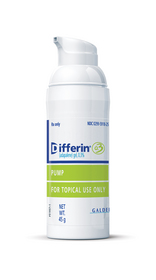FORT WORTH, TX--(Marketwire - March 05, 2012) - Galderma Laboratories, L.P. received approval from the U.S. Food and Drug Administration (FDA) for a pump dispenser for Differin® (adapalene) Gel, 0.3%, a retinoid indicated for the topical treatment of acne vulgaris in patients 12 years and older. This approval marks the first-ever pump dispenser for Differin Gel, 0.3%, the #1 most-dispensed brand of topical retinoid among dermatologists.(1) The Differin Gel, 0.3% pump will be available via prescription in pharmacies nationwide in the second quarter.
“Use of a topical retinoid is well recognized as an important part of the foundation in acne treatment based on several clinical studies, published treatment guidelines, and widespread experience in many patients over the past few decades. In my experience as a dermatologist, Differin Gel, 0.3% has proven to be a very effective and well tolerated single-agent topical retinoid which is consistent with what has been shown in multiple short-term and long-term clinical trials in patients with acne. The availability of a metered pump delivery container allows patients to consistently apply a proper amount of medication without any waste,” said Dr. Jim Del Rosso, a dermatologist in private practice in Las Vegas, Nevada, dermatology residency program director at Valley Hospital Medical Center, and past president of the American Acne and Rosacea Society. “Results of a patient preference survey that evaluated different container presentations of the same product showed that many acne patients prefer a pump delivery system over a tube. The main reasons for preference of the pump over a tube were primarily convenience, ease of use, and the ability to be consistent with the application of a correct amount of medication which is to be spread in a thin layer over and into the skin surface and not only applied to individual ‘pimples’ on the skin.”
Patient Preference Survey Results
A recently completed preference survey, which involved 291 physician-diagnosed acne patients ages 12 to 35, ascertained patient preference for a pump delivery system of an adapalene-containing acne product versus a tube.(2a) Results showed that acne patients prefer an enhanced delivery system. Acne patients found the pump to be more convenient, easier to use and more attractive than the tube.(2b) Of note:
- 79% of acne patients responded they preferred the new pump delivery system over a tube.(2c)
- 92% of acne patients rated their experience as “satisfied” with the pump delivery system.(2d)
- 88% of acne patients said the pump made it easier for them to follow their doctor’s instructions.(2e)
- More than 90% of acne patients found the pump to deliver a consistent amount of product to their face during each use and to save time during treatment administration.(2f)
Differin Gel, 0.3% Efficacy and Tolerability Results
Differin Gel, 0.3% has been shown to have the powerful efficacy and favorable tolerability of a single-agent retinoid. In a Phase 3b, 12-week, non-inferiority, multicenter, investigator-blinded, controlled clinical study of 172 patients 12 to 35 years of age with acne vulgaris, adapalene was found to be non-inferior to tazarotene gel, 0.1% at the end of 12 weeks.(3a) A total of 160 patients participated in the satisfaction survey. Differin Gel, 0.3% was found to offer comparable lesion reduction compared to tazarotene gel, 0.1% throughout 12 weeks: 61% total inflammatory lesion reduction with Differin Gel, 0.3% vs. 57% with tazarotene gel 0.1%.(3b) Differin Gel, 0.3% also demonstrated superior tolerability compared to tazarotene gel, 0.1% throughout the 12 weeks.(3c) Cutaneous tolerability scores were significantly lower with Differin Gel, 0.3% vs. tazarotene gel, 0.1% for all parameters (erythema, scaling, dryness, and stinging/ burning).(3d) In addition, 86% of patients were satisfied or very satisfied with Differin Gel, 0.3% treatment.(3e)
In a single-center, randomized, investigator-blinded, bilateral (split-face) comparison of 30 healthy subjects age 18 or older, subjects received Differin Gel, 0.3% on one-half of the face and tretinoin gel microsphere, 0.04% on the other half for 21 days. Tolerability parameters (erythema, dryness, burning/stinging, and scaling) were assessed in healthy subjects. A total of 29 patients participated in the preference study.(3f) Results showed that Differin Gel, 0.3% demonstrated comparable tolerability to tretinoin gel microsphere, 0.04%.(3g) Differin Gel, 0.3% was well tolerated with a mean score below 1 (mild) across all 4 tolerability parameters (erythema, scaling, dryness, and stinging/ burning).(3h) Patients found the overall tolerability of Differin Gel, 0.3% favorable compared to tretinoin gel microsphere, 0.04%.(3i) After 5 days of treatment, 59% of patients preferred the overall tolerability of Differin Gel, 0.3% vs. 41% of patients with tretinoin gel microsphere, 0.04%.(3j)
About Acne
Acne vulgaris is one of the most widely experienced chronic skin diseases. In recent years, research has lead to a greater understanding of the pathogenesis of the disease.(4) The disorder begins with the onset of puberty and is thought to result from hormonal action on the skin’s oil glands (sebaceous glands) leading to plugged pores and outbreaks.(5) It can be challenging to manage due to the variability in response to treatment and the need for long term therapy.(6)
About Galderma
Galderma, created in 1981 as a joint venture between Nestle and L’Oréal, is a fully-integrated specialty pharmaceutical company dedicated exclusively to the field of dermatology. The Company has a presence in 65 countries with over 1,000 sales representatives and is committed to improving the health of skin with an extensive line of products across the world that treat a range of dermatological conditions including: acne vulgaris, rosacea, fungal nail infections, psoriasis and steroid-responsive dermatoses, pigmentary disorders, medical solutions for skin senescence and skin cancers. With a research and development center in Sophia Antipolis, France, Galderma has one of the largest R&D facilities dedicated exclusively to dermatology. Leading U.S. brands include Epiduo® Gel, Differin® Gel, 0.3%, Differin® Lotion, 0.1%, MetroGel® 1%, Oracea®, Cetaphil®, Tri-Luma® Cream, and Vectical® Ointment.
For more information about Galderma, please visit www.galderma.com.
Important Safety Information
Differin® Gel, 0.3% is indicated for the topical treatment of acne vulgaris in patients 12 years and older. Cutaneous irritation (erythema, scaling, dryness and/or stinging/burning) has been reported in clinical studies of these products. The majority of cases were mild to moderate in severity, occurred early in treatment and decreased thereafter. Other side effects that may occur from Differin Gel, 0.3% include dry skin, skin discomfort, pruritus, desquamation and sunburn.
Concomitant use of potentially irritating products or overexposure to sunlight or sunlamps, extreme wind or cold, may increase the potential for irritation. Use of sunscreen and protective clothing over treated areas are recommended when exposure cannot be avoided. Do not use Differin Gel, 0.3% if you are allergic to adapalene or any of the other ingredients in the product. Talk to your doctor to learn more about Differin Gel, 0.3%.
You are encouraged to report negative side effects of prescription drugs to the FDA. Visit www.fda.gov/medwatch or call 1-800-FDA-1088.
References:
(1) Differin Website. Accessed on February 29, 2012 at http://differin.com/.
(2) Galderma Laboratories, L.P. Clinical Study Report (Gli.04.Sre.Us10184). August 2011.
(3) Galderma Data on File. Differin Pump Phase 3 Key Messages.
(4) Gollnick H, Cunliffe WJ, Berson D et al. Management of Acne: A Report From a Global Alliance to Improve Outcomes in Acne. J Am Acad Dermatol. 2003; 49(1):S1-S37.
(5) Nemours Foundation. Why Do I Get Acne? http://www.kidshealth.org/teen/your_body/skin_stuff/acne.html.
(6) Thiboutot D, Pariser DM, Egan N, et al. Adapalene Study Group. Adapalene gel, 0.3% for the treatment of acne vulgaris: a multicenter, randomized, double-blind, controlled, phase III trial. J Am Acad Dermatol. 2006;54(2):242-250.
Contact:
Christiane Robinett
(817) 961-5196
Christiane.Robinett@galderma.com
Melissa Rowley
(212) 301-7208
mrowley@wcgworld.com





